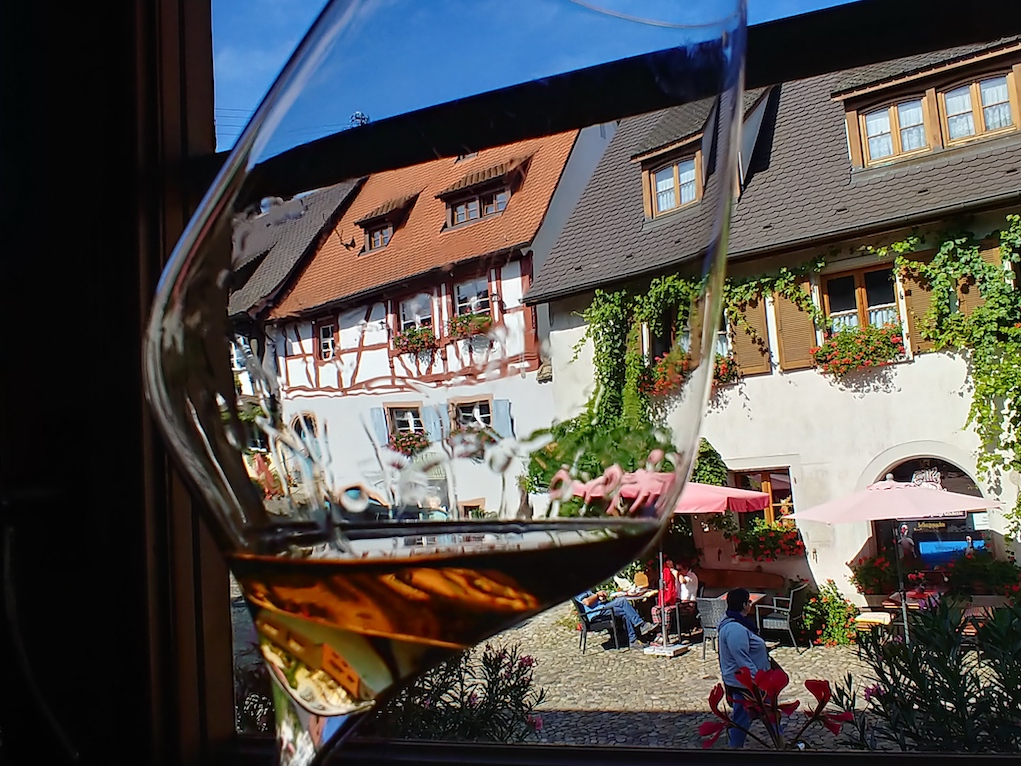It was like a storybook fairytale come true when I walked around the Burkheim village in the Baden wine region of South Germany with winemaker Arne Bercher. The Bercher family can be traced back to 1457, originating in Switzerland. In 1756, they built their manor/cellar in Burkheim, located in the Kaiserstuhl range of volcanic hills. As we walked down the stone covered roads that passed a museum that looked like it was straight out of a Dr. Seuss story, we walked into a field with terraced vineyards in the background that contained the volcanic soils that were highly prized for their complex and compelling Pinot wines.
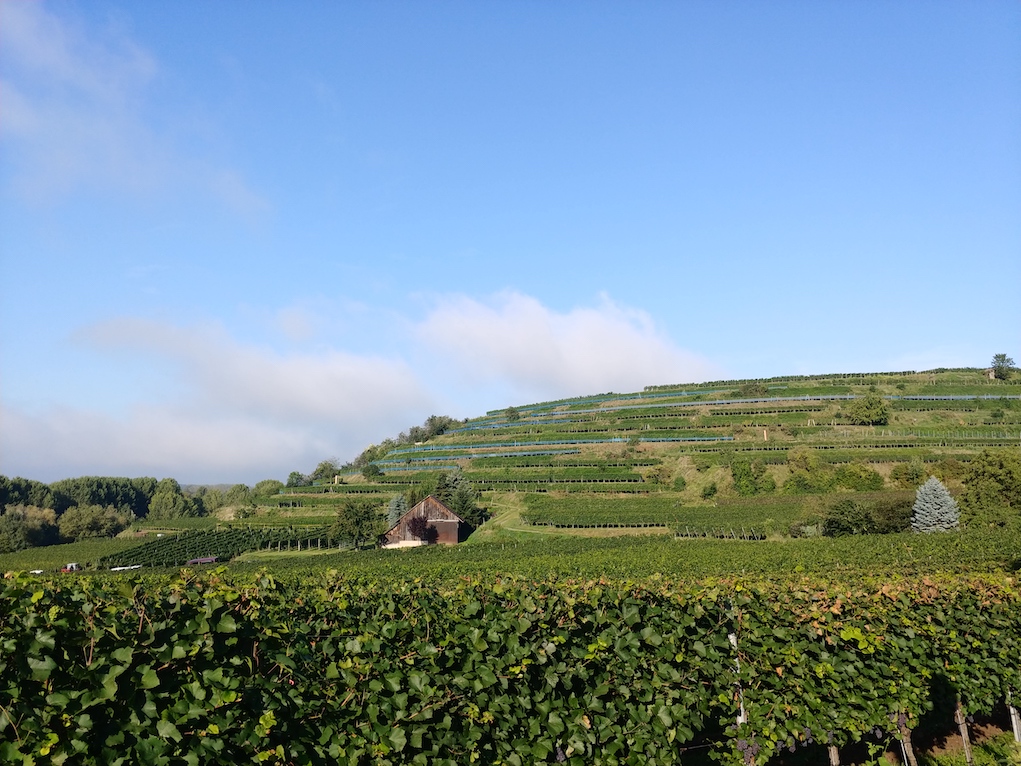
Weingut Bercher
Arne’s family winery is Weingut Bercher and they are devoted to keeping their precious vineyards protected by sustainable practices balanced with modern technology in the cellar. Arne remarked on the Burkheim locals, only around 1000 people, who show their commitment to protecting their historical look by investing to keep such things like a local medieval castle restored. It is interesting to note that the village has three sections, and historically the inhabitants in the upper city worked in the vineyards, the people in the middle city were tradesmen (butchers and bakers) and the lower city had fishermen since the Rhine River used to meander into the lower section. “Til this day if someone knows you are from Burkheim they will ask you which part of the city you are from to figure out your profession,” Arne said with a warm smile.
The ranges of Kaiserstuhl, where Burkheim lies, is one of the warmer areas in Germany, nestled in the Baden region that produces rich Pinot Noir (Spätburgunder), Pinot Blanc (Weissburgunder) and Pinot Gris (Grauburgunder) wines; yet they are laced with minerality and retain a good kick of acidity that makes them delicious and thrilling. These wines are pleasantly shocking for someone like myself who, in the past, has tried Pinot Noir from German regions that did not achieve such ripeness and the wines seemed too thin and austere; but even the cooler vintages savored during the tasting at the Bercher winery proved to have that sweet spot of fruit to balance the marked acidity and minerality.
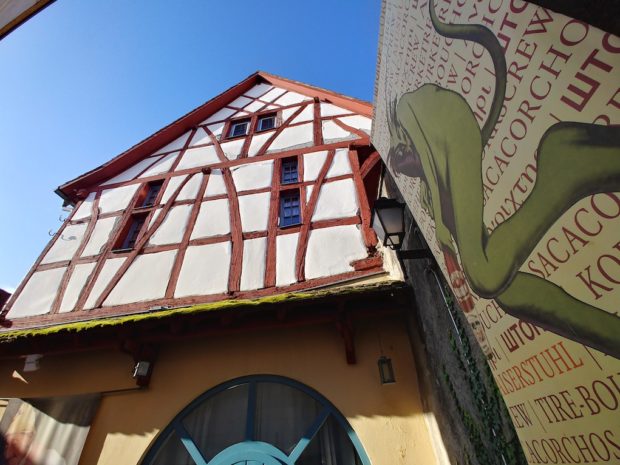
Volcanic Soils
“You can see the types of soil that we have as it is really dark, volcanic soil,” Arne noted as our eyes glanced at the vines in front of us; then as our eyes gazed upon the terraced volcanic vineyards, we could see a little house nestled in the patchwork of land. Arne stated that the Rhine was less than half a mile away from the vineyards, and the beginning of the Alps can be seen on a clear day from that little house among the vines. Arne said that although he thought the volcanic soil imprinted itself on the wines with more complexity, saline minerality and the ability to age, it was really a mosaic of different volcanic soils with some having more ash, some more hard rock and others a thick layer of loess, and he explained that despite this fact causing many challenges, it is part of what makes working with these wines exciting.
Patience for a Future Beyond Oneself
Arne talked about the patience of the area of Burkheim and the knowing wisdom that it is better to see how things settle instead of to jump to a bad decision, even if it means that it will take a couple of generations to see the benefits. He spoke about fighting the push to plant more Pinot Noir instead of the whites like Pinot Gris or Pinot Blanc because of a trend towards warmer weather despite Baden being recently hit by a few cool vintages too. But oddly enough, there was a time that many thought Germany could not make Pinot Noir wines on the level to compete with Burgundy, yet Baden has slowly been making a name for high quality Pinot Noir such as the ones made by Bercher. In addition, Arne doesn’t want to risk their Pinot Noir reputation by planting the grapes where they shouldn’t be planted just because a couple of vintages were ideal for the grape; and he loves the whites from the area, even if they don’t fit current market trends.
During my tasting with Arne he noted that one of his best Pinot Noir (Spätburgunder) vineyard wines (VDP Grosse Lage “Burkheimer Feuerberg Kesselberg”) from the 2016 vintage needed some more time in bottle to truly show its exquisite charm, but he said that that was part of the pleasure of the wine; it was lovely yet it would only get better with time. And as I glanced outside his window facing the precious town that was surrounded by big, beautiful unpolluted skies and remembering the open land with the labor intensive terraced vineyards, I realized that there is something to having the patience to wait; wait for something that you value to evolve and eventually be appreciated, instead of destroying something you love just to move with the times. That is just what Bercher has done and it has only taken them over 250 years to get there.
A brief description of the wine classification from the VDP group that was established in Germany in 2012 that are used for the Bercher wines is listed below: VDP Gutswein is an entry-level wine, VDP Ortswein is a wine that comes from a village’s best vineyards, VDP Erste Lage is a wine that comes from 1er Cru or “first-class” vineyards and VDP Grosse Lage is a wine made from one of the best vineyards. A winery has to be accepted into the VDP organization to receive classification.
Everyday Drinking Wine (less than $15)
2015 Heger, Pinot Noir, Baden, Germany ($19.99 liter/$14.99 750ml): 100% Pinot Noir (a.k.a. Spätburgunder). Another producer, Heger, is also in the Kaiserstuhl area of Germany but they not only make their own volcanic soil estate wines but also source fruit from other growers in the region for their more value-driven wines. If the wine is called Dr. Heger it is one of their estates’, if it is called simply Heger then it has been sourced from other growers. Joachim Heger continues the wine making tradition started by his grandfather, Dr. Max Heger, whose patients, primarily local wine growers, sparked his interest in making wine himself. This Pinot Noir has juicy red fruit with a hint of spice and floral notes.
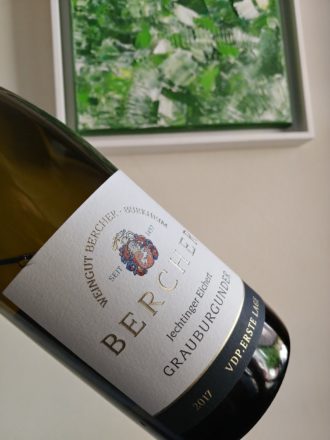
Special Occasion Wine (from $15 to $50)
2017 Bercher, Grauburgunder, VDP Ortswein, Jechtingen village, Baden, Germany ($19): 100% Pinot Gris (a.k.a.Grauburgunder). This is a blend of Jechtingen’s best vineyards that are not officially classified as top sites. A good energy with a linear body and hints of hazelnuts and wet stones on the finish.
2018 Bercher, Weissburgunder, VDP Ortswein, Burkheim village, Baden, Germany ($20): 100% Pinot Blanc (a.k.a. Weissburgunder) This is a blend of Burkheim’s best vineyards that are not officially classified as top sites. This has an intense minerality and stony notes that was broader in body than the above Pinot Gris.
2016 Bercher, Spätburgunder, VDP Erste Lage “Jechtinger Eichert”, Jechtingen village, Baden, Germany ($42): 100% Pinot Noir (a.k.a. Spätburgunder). This is from an Erste Lage (1er Cru) vineyard called Jechtinger Eichert from the village of Jechtingen, near Burkheim, where Bercher also has vineyards. A smoky minerality that has flavors of black cherries.
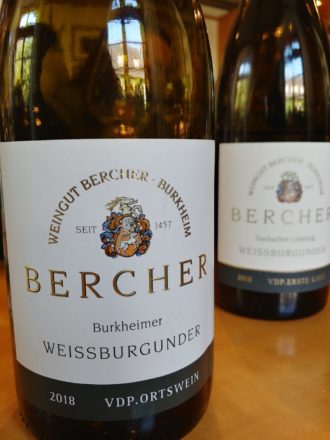
Fantasy Wine (over $50)
2016 Bercher, Spätburgunder, VDP Grosse Lage “Burkheimer Feuerberg Kesselberg”, Burkheim village, Baden, Germany ($60): 100% Pinot Noir. This is from a Grosse Lage (Grand Cru) vineyard that represents one of the best sites for Pinot Noir in the Burkheim village. Arne said about this vineyard, ”in my opinion Kesselberg has more layers to it, more complexity, maybe it’s a little bit darker; it will probably need two more years.” This Kesselberg is from a vintage that Arne considered great, 2016, as the wines have lots of acidity and structure and have a nice plush mid-palate that balances the crisp acidity with layers of black and red fruit, espresso and Asian spices with a velvety texture on a very long finish.
